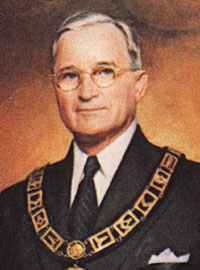
I'm posting this review even though I disagree with the premise
that our political leaders are psychopaths, and the way to save the world
is to diagnose and prevent psychopaths from holding power.
Author Andrew Lobaczewski completely overlooks the obvious, that
our "leaders" belong to a satanic cult, the Illuminati (Cabalist Judaism/ Freemasonry)
and are dedicated to enslaving and destroying humanity.
To define a psychopath as someone born without a conscience is absurd in a society
dedicated to eradicating the source of conscience, the knowledge of God.

(left. Hitler-Himmler Masonic handshake)
"Oversimplification of the causative picture as regards the genesis of evil, often to a single easily understood cause or one perpetrator, itself becomes a cause in this genesis. . . . Any attempt to explain the things that occurred during the first half of our [twentieth] century by means of categories generally accepted in historical thought leaves a nagging feeling of inadequacy. Only a ponerological approach can compensate for this deficit in our comprehension, as it does justice to the role of various pathological factors in the genesis of evil at every social level." (Lobaczewski, 144, 109)
Our modern Western culture lacks an adequate framework to understand the causes and processes of what we commonly refer to as evil in our history. The Third Reich, the Bolshevik Revolution, Stalinism... Our body of literature, social sciences, and our common sense of morality only scratch the surface of a true comprehension of the nature of evil. Thus, the very people who are, in fact, the initiators of the greatest ponerogenic activity pass undetected. Our lack of understanding will inevitably lead to the very problems that the majority of humanity seeks to prevent.
In literature and film, evil is romanticized; portrayed as mysterious, yet beautiful; dark, yet conflicted. There is always a heart of gold beneath a cold-blooded exterior. The Hollywood psychopath, rarely depicted accurately, evokes both our disgust and our sympathy; war heroes slaughter their enemies ruthlessly, yet live loving lives as husbands and fathers. If the villain did not have a rough childhood, or does not show any signs of a struggle of conscience, he is seen as "two-dimensional" and "unrealistic".

Leading social scientists and psychologists promote a similarly narrow view of evil, dealing only with its social and moral aspects. In other words, they study effects; not causes. One such researcher argues that "most evil is the product of rather ordinary people caught up in unusual circumstances that they are not equipped to cope with in the normal ways that have worked in the past to escape, avoid or challenge them, while they are being recruited, seduced, initiated into evil by persuasive authorities or compelling peer pressure." According to this researcher, the line of distinction between a sadistic torturer at Abu Ghraib, and a non-violent peace activist is simply one of chance.
These somewhat naive views on evil are not entirely wrong. Movies can accurately portray psychotic, or even psychopathic, serial murderers; the common view of evil can accept that human frailties and ambitions often degenerate into bloodthirsty madness. However, both of these views demonstrate a complete ignorance of the causal role of psychopathology (especially essential psychopathy) in the genesis of evil, or ponerogenesis. Film ignores an analysis of the psychopathic parent that creates the traumatized child; social sciences ignore the influence of psychopathy on the minds of normal humans and the specific processes that give rise to ignoring one's conscience.

(left, Truman the mass murderer of Hiroshima in Masonic attire)
Moreso, the common view of evil still partly justifies the blood-stained solutions of past, present, and future politicians. In such a way is the destruction of Hiroshima and Nagasaki, the firebombing of Dresden, to the present day occupation of Iraq and Palestine justified. And without an understanding of the role of psychopathy, any attempt to objectively evaluate such symptoms of macro-social evil, no matter how accurate, can be co-opted by spellbinders. In such a way, a partial truth can be used as justification and as a rallying point for further destruction.
PSYCHOPATHY: THE CAUSE OF EVIL
Inherited and acquired psychological disorders and ignorance of their existence and nature are the primal causes of evil. The magic number of 6% seems to represent the number of humans who either carry the genes responsible for biological evil or who acquire such disorders in the course of their lifetime. This small percent is responsible for the vast majority of human misery and crime, and for infecting others with their flawed view of the world.
The scope of evil does not respect any boundaries of race, doctrine, or ideology. All races carry the genes, and all schools of thought are susceptible to their influence. These pathological factors that influence behaviour form a complex web. It is only in such a web that the "environmental evil" wherein circumstances can influence a normal person to commit harmful acts can be understood.

(Winston Churchill being installed into the Albion Lodge in 1908)
Of 5000 psychotic, neurotic and healthy patients, Lobaczewski identified 384 (7.7%) who caused serious harm (physical and/or emotional) to others. Some of these had been penalized for their actions and some had been protected by Communist government of the time. Contrary to the common moralistic interpretation of evil actions ("evil consists of making evil choices"), and also contrary to legal systems which views psychopaths as sane and thus responsible for their actions, the vast majority (85%) of these 384 individuals showed psychopathological factors influencing their behaviour. It is likely that, without these factors present, the harmful actions would not have taken place. These psychological factors limit the subject's ability to control their actions. In this sense, a moralistic interpretation to psychopathic behavior is fundamentally flawed.
While a moral sense (lacking in psychopaths) can be seen as necessary to be held morally responsible, that is not to say that psychopaths should have free rein to destroy lives. Psychopathic individuals can have a number of effects on normal people: they can fascinate, traumatize, cause pathological personality development, or inspire vindictive emotions (a result of viewing evil as simply a "choice"). An example of this variety can be seen in the host of groupies, pen pals, supporters, and love-struck fans that flocks towards dangerous serial killers like Richard Ramirez and Ted Bundy. One fan of Ramirez said, "When I look at him, I see a real handsome guy who just messed up his life because he never had anyone to guide him."

These effects and the confusion they engender can then lead to, and reinforce our collective ignorance of such individuals. We rarely hold responsible the individual who influences another to commit evil, but instead moralistically punish only the agent of an act. The true cause of 'evil' actions goes unpunished, much like an Army Private punished for the crimes of his superiors. In fact, the true source of 'evil' may be separated from a specific action by both vast stretches in time (i.e., in literature and tradition) and by large distances (i.e., by mass media).
"The practical value of our natural world view generally ends where psychopathology begins." (Lobaczewski, 145)
PONEROLOGY: A NEW SCIENCE
No matter how eloquently and accurately authors (novelists, dramatists, poets, historians) describe the occurrence of evil, a disease cannot be cured through description alone. Our natural language cannot adequately explain the concepts surrounding such phenomena. Only a scientific understanding drawing from psychological, social, and moral concepts can approach the understanding necessary to prevent the emergence of mass madness seen so many times in the history of our planet.

(left, Theodore Roosevelt in his Masonic garb)
Ponerology describes the genesis, existence, and spread of the macro-social disease called evil. Its causes are traceable and can be repeatedly observed and analyzed. When humanity manages to incorporate this knowledge into its natural worldview, it will have defensive potential as yet unrealized.
Thanks to Hans for sending me this link with these comments:
I read your 3 books again and again. Always finding other aspects of the real history I did not know. Alongside your books I also read Political Ponerology by Andrew Lobaczewski. a necessary explanation of your books and your article "An Invisible Cancer Gnaws at Society". It is the only sufficient explanation and way to end the hopelessness expressed in your article. As I see it we have to dive deep into the psychopathology and determine the people by name in this terminology. DSM-V is quite insufficient (I think is written by psychopaths) and we have to promote the book "Political Ponerlogy" on all universities as a duty. Without thorough knowledge of this book, no university diploma [should be giving] in psychology, or psychiatry.
With this knowledge one can determine the proven connection between psychopathy and membership of freemasonry, rosicrucianism, and other secret societies where JFK talked about in his famous speech. With Lobaczewski's knowledge, the law has to be be changed to prevent psychopaths in any responsible position. If a person has all the criteria of a failing conscience he or she has to be removed from his position. There is already a lot of knowledge about psychopaths in interpersonal relationships in society, so why not make a public test to sift out and determine these characters in the whole society? Schizophrenics are also not allowed to have a public function so why allow psychopaths?
First Comment from Dan
I concur with your insight that the premise of Ponerology theory is flawed. I read the book in late 2006 and found the idea so compelling because there is some truth to it.
In 2003 I attended a conference of behavioral psychologists. I'm not a psychologist but I knew one, and they couldn't attend, and asked me if I'd like to go in their place. I gladly accepted free four days in nice hotel with meals provided, plus free lectures. One seminar was on 'Recent developments in the pathology of the brain'. Psychopaths have a common defect of the brain physiology or how they're "wired". I won't go into that here, it would take a couple of pages. Suffice to say that a true sociopath's brain doesn't process emotions like we do. A diagnosed sociopath told me once he couldn't feel anything but pain, sex, and anger, but he could mimic normal emotions.. He said he learned to do it by watching people.
It's very easy to believe that our lovely politicians and celebrities are such people. Some of them would have to be, and a lot of them are. So I pursued studying this theory in real situations. I noticed in forums, or in person, before very long people would begin to accuse anyone who disagreed with them of being a psychopath! Soon, people proposed laws, such requiring political candidates to pass the Hare Psychopathy test to run for office . Others suggested mandatory screening of children in first grade for signs of psychopathy - and psychopath tests to get a marriage license, etc.
I came away thinking I'd just experienced in miniature what it was like living in Germany when they were creating the Nuremberg laws. Once you pin the responsibility for everything evil in human society on a single culprit, pretty soon you and your friends are making plans for Nuremberg laws and discussing what's to be done with them.













Phil said (February 28, 2014):
I read this book 4-5 years ago and have to say that one unintended consequence was to deeply and carefully analyze some of my own personality flaws. Whether or not a sociopath can actually self-diagnose, I think that anyone who is ambitious (particularly in our amoral modern climate) would do well to comb through their darker instincts and motivations.
The process was humbling and a little scary, but I think I came out the other end with some logical tools to aid me against Hollywood's lures that perhaps some of my lesser-acknowledged demons might have been drawing me toward.
One wonders if Elvis Presley or Bernie Madoff had done such personal work if they might not have lost themselves to "the dark side."